By Mandy Dukovan, MS, MFT, Marriage and Family Therapist, Fed is Best Foundation Senior Advisor
It’s incredibly hard to put into words all the things that The Fed Is Best Foundation has done for me over the past year. I stumbled upon the Foundation when I noticed a friend of mine “liked” one of their blog posts. I was a first-time mom who was struggling with many different feelings and wasn’t sure who or where to turn to. My son was two months at the time and was just beginning to thrive after I began supplementing him with formula. While I was so happy to see my baby finally gaining weight and thriving, I had haunting memories and raw emotions that I struggled to sort out. I had immense guilt that I didn’t see the signs that my baby was hungry, which tortured me non-stop. I was embarrassed to look at his 1-month picture and now see that he was obviously malnourished, but how on earth did I miss this at the time?
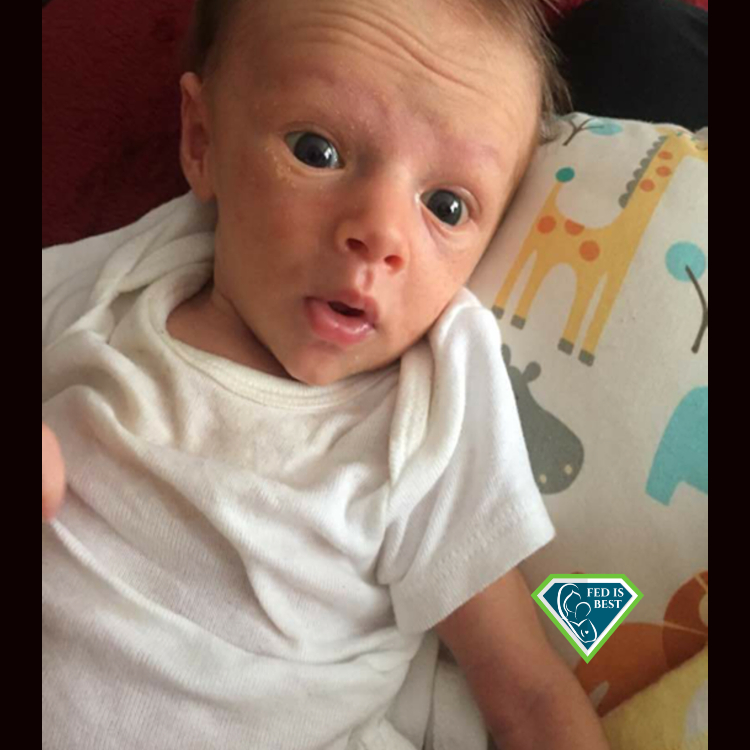
1 Month Old
I was angry that I didn’t follow my instincts that something was wrong with him and was angry that I believed all the terrible things I was told by lactivists that would happen to him if I gave him a drop of formula. I worried that we would not have the kind of bond that babies who were exclusively breastfed (EBF) experienced with their mothers. I now know our bond is much stronger because we bottle-fed him and no longer experienced the immense stress that came each time I tried to breastfeed my baby. I got to a point where I dreaded even trying to breastfeed him, but I was told that was the best thing I could do for my baby, so I kept going at the expense of my baby’s health and my well-being. I honestly believed I was the only mother who had experienced what we went through because I only heard the stories about how amazing and natural breastfeeding was, and every mother could breastfeed if only she tried hard enough.
Since I am a therapist, I knew I needed to share my story. I found courage in my strong desire for other babies and mothers not to struggle. I also found courage in the fact that I needed a reason for all of the suffering—I needed to know that Brock’s struggle was not in vain. I kept telling myself, “If I reach even one mother and prevent even one baby from suffering like Brock, then I have to do this.”
I had countless moms—some that I knew personally, many I did not—send me messages thanking me for having the courage to share and for saying the things they were too ashamed to admit. I had a mother message me and tell me, “these were the words I so desperately needed to hear right now.” I had friends and family message me to say that their friend or family member from another state had shared our blog and how proud they were to tell them that they knew me. I had friends message me that they never truly believed that there were mothers who “couldn’t breastfeed” until they read my story.
And then I received hate messages from lactivist internet trolls. I was called every possible name, but what still pierces my healing heart is that I was told I should go kill myself because I was a piece of shit mom and my baby would be better off without me. I believed them.
I thought a great deal about all the feelings I have experienced throughout my son’s first year of life, and I realized that they mirrored the stages of grief. It is commonly thought that there are seven stages of grief that one must move through during the grief process. A common misconception is that the grief process appears as steps that the person moves through in a sequence. They start at one stage, and once they’ve moved through that stage, they go to the next stage until they have gone through all the stages, and then they “should” be over their grief. In reality, the stages of grief are circular and happen in different sequences for different people. They aren’t check marked off your grief to-do list. It is quite common for individuals to move through these different stages for the rest of their lives and never truly over their grief.
The first stage of grief is commonly referred to as the shock and denial stage. For me, my denial started early. My instincts told me that something wasn’t right, but I was a new mom, and no one else seemed concerned, not even his doctor, so I thought I was overreacting. It wasn’t until I took him to our first appointment with a nurse lactation consultant, and he had only gained half an ounce from birth, that I could no longer deny that something was wrong with my baby. My next shock came when I returned to the LC the following week, and he had gained two pounds in one week.
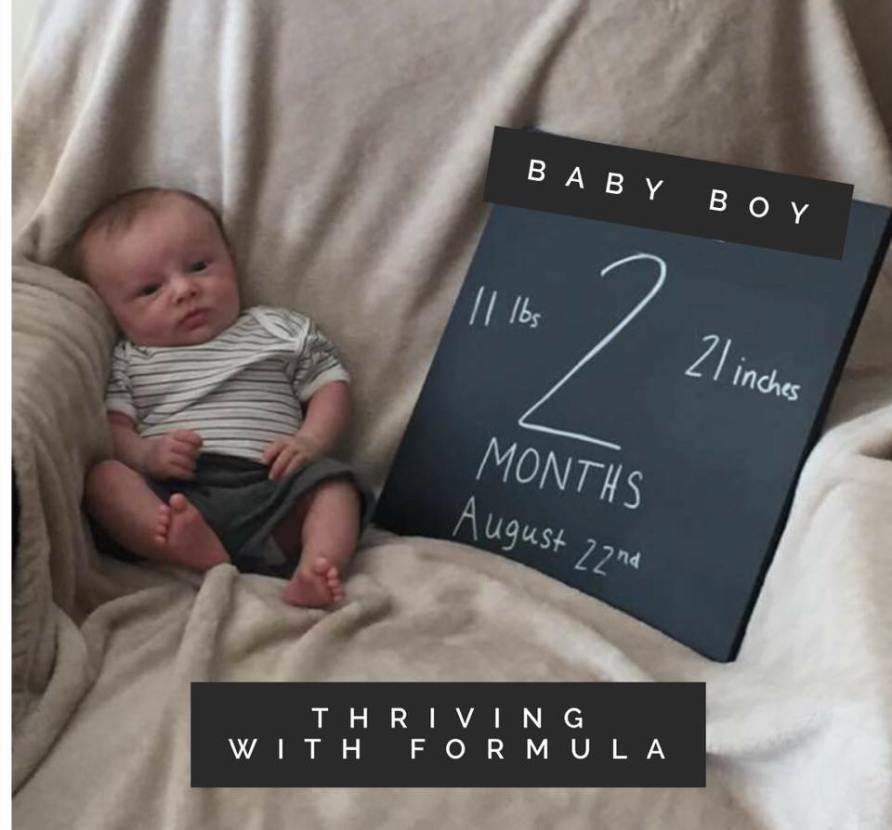
The next stage I entered was the pain and guilt stage. I felt like the world’s worst mom as it was, but I had the internet confirming these thoughts. How could I have not known my baby was starving because “Any idiot can see that baby is starving?” Why did I not listen to my mommy instincts? How could a mom do this to her baby? As if it were something I had done on purpose. I was already feeling like a terrible mother, and the internet trolls were telling me I was a “POS mother” and that I should “kill” myself.
And I promptly moved into the anger stage. I was angry at myself for starving my baby. I was angry at his doctor. I was angry that no one told me my baby looked sick. I was angry that people judged me harshly without knowing me or my situation. I was angry that so many moms could breastfeed their children. I was angry for reasons I couldn’t explain. I was just angry.
These feelings of anger were coupled with feelings of extreme anxiety, sadness, and feelings of loneliness. I felt like such a failure as a mother. I couldn’t do the one thing that we are told mothers are supposed to be able to do for their children. Breastfeeding is supposed to be so “natural.”
I would be rocking my baby to sleep at night and cry the entire time because I was convinced that I would die before his first birthday. I had no interest in activities of interest, and the thought of being in social situations was so overwhelming. I was so afraid that people would ask how I was doing, and I would either burst into tears, or they would see through me. I could not concentrate, I was irritable, my body hurt all the time, I was exhausted but couldn’t sleep. I kept waiting for things to get “better,” but they were not. That’s when I made an appointment to see my doctor. I kept saying it must be my thyroid, but deep down, I knew I was very much suffering from postpartum depression. As I answered the nurse’s questions from the Edinburgh Postnatal Depression Scale, tears ran down my face because I could no longer deny that I was very much in a state of depression. My doctors looked at me and said, “What would Mandy, the therapist, say to Mandy, the client, if she walked into your therapy office?” Through the tears, I said, “I would tell her that she is a strong person, but she is going through a really rough time, and it is okay that she needs help”. He told me that he agreed and suggested I start taking an SSRI.
After I began my medicine, I began to move toward the upward turn. I had shared our story with the Fed is Best Foundation and I knew it was reaching so many mothers who were struggling with their own feeding issues. I had been telling myself that there was a purpose for sharing our story and a purpose in the pain, but for the first time, I actually believed it. I felt as if I could reconstruct our story and truly begin to work through the pain of the last year.
I sometimes find myself going through one of the previous stages. I can be reading an article about the potential effects of insufficient intake on brain development, and I instantly tear up and think about the what-ifs. But I have truly begun to work through the acceptance and hope stage. I know there is nothing I can do to change the past. I can’t go back and give my baby formula from the very beginning. I can only look to the future and move forward. I can only use my experience and my voice to ensure that all babies are properly fed.
When I look at my healthy, happy, funny, and thriving little boy, I know that I am not a failure as a mom. I know that my worth as a mother is not a reflection of how he was fed, but in the fact that he was fed with love and with science milk, which provide babies with optimal nutrition to thrive. Don’t ever forget that.
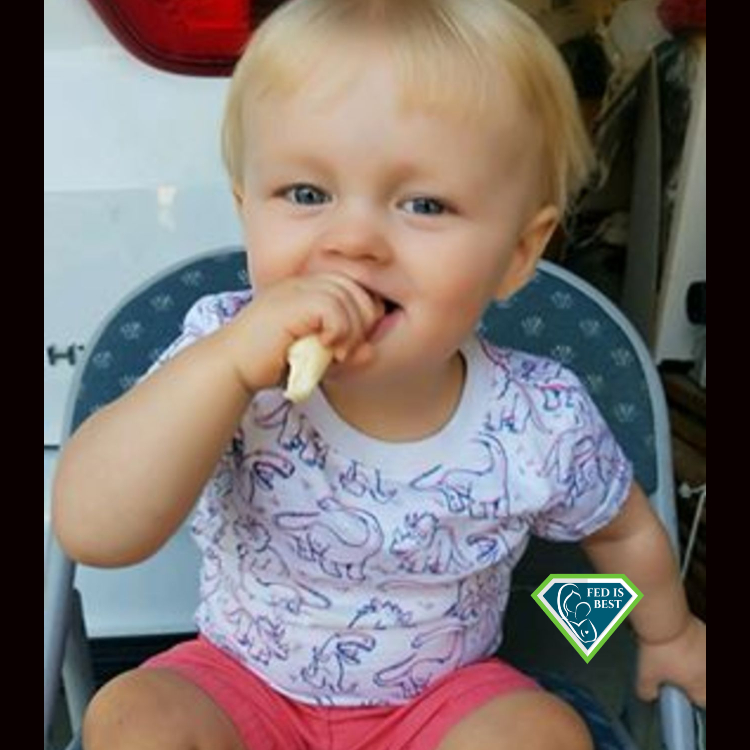
My advice for parents for safe infant feeding is to follow the rules:
Rule #1: Download and read the FREE infant feeding plan from the Fed Is Best Foundation website. Trust your instincts if you think something isn’t right with your baby, and KNOW the signs of a well-fed baby.
Rule # 2: Do not listen to mommy groups for breastfeeding advice. They are dangerous and have caused suffering and harm.
Rule # 3: Before you pick your pediatrician make sure you ask them questions to know if they are a #FedisBest doctor.
Rule #4: Invest in a newborn scale or get weekly weight checks during the first 2 months of life and then every few weeks to be sure your baby is thriving and gaining weight.
My advice for moms who could not make enough breast milk and were given very bad advice is to be gentle with yourself and give yourself the grace you would give others. I remember thinking, “I would never think the things of other mothers that I am thinking about myself. I would never tell another mother that she is a failure, so why am I telling myself this? Why can’t I show myself the same compassion I would any other mother?” I would tell them to feel the emotions they need to process their guilt, find other mothers who have been through similar experiences, and know they are not alone. For me, I found healing in talking about it to others. Find whatever it is that helps you through their grief, and do it! If it is talking to others, then talk to others. If it is writing about it, write about it! If it is reading, then read! If it is prayer or meditation, then pray or meditate! If it is exercise, exercise. Just don’t do anything and hope that it goes away. Just know they are not alone, and The Fed Is Best Foundation can help you!
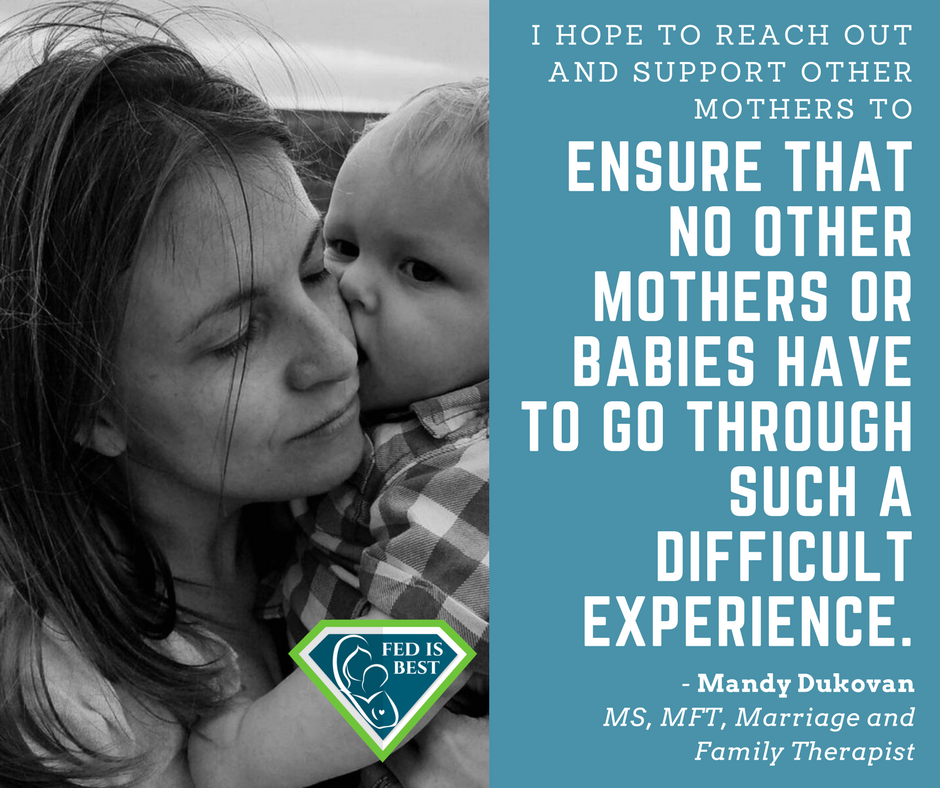
HOW YOU CAN SUPPORT FED IS BEST
There are many ways you can support the mission of the Fed is Best Foundation. Please consider contributing in the following ways:
- Join the Fed is Best Volunteer group to help us reach Obstetric Health Providers to advocate for counseling of new mothers on the importance of safe infant feeding.
- Make a donation to the Fed is Best Foundation. We are using funds from donations to cover the cost of our website, our social media ads, our printing and mailing costs to reach health providers and hospitals. We do not accept donations from breast- or formula-feeding companies and 100% of your donations go toward these operational costs. All the work of the Foundation is achieved via the pro bono and volunteer work of its supporters.
- Share the stories and the message of the Fed is Best Foundation through word-of-mouth, by posting on your social media page and by sending our resources to expectant moms that you know. Share the Fed is Best campaign letter with everyone you know.
- Write a letter to your health providers and hospitals about the Fed is Best Foundation. Write them about feeding complications your child may have experienced.
- Print out our letter to obstetric providers and mail them to your local obstetricians, midwives, family practitioners who provide obstetric care and hospitals.
- Write your local elected officials about what is happening to newborn babies in hospitals and ask for legal protection of newborn babies from underfeeding and of mother’s rights to honest informed consent on the risks of insufficient feeding of breastfed babies.
- Send us your stories. Share with us your successes, your struggles and every thing in between. Every story saves another child from experiencing the same and teaches another mom how to safely feed her baby. Every voice contributes to change.
- Send us messages of support. We work every single day to make infant feeding safe and supportive of every mother and child. Your messages of support keep us all going.
Thank you so much from the Founders of the Fed is Best Foundation!

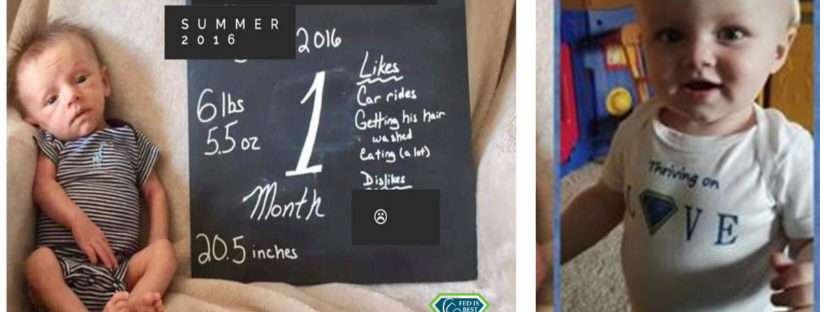
Hugs from one unable to nurse a baby momma to another. I was felt shamed after i gave my newborn baby formula after two days of trying to nurse him after birth. Looking back on photos its clear he wasnt gaining. We had taken him to the baby clinic where the np spoke up and asked would you feel bad if I suggested formula. We replied nope. She also told us something that really stuck with me. There are only three opinions that mater in all of this and pointed to me, hubby and baby. It took two weeks but my baby finally caught up in his weight and has been happy since.
I am a lactation consultant working in Australia. I am so sorry that you received such hatred from a fellow LC! I am embarrassed and ashamed to be associated with such people because I carry the same job title! I have had many cases like yours arrive in my office and have had to council mothers through these very difficult times. My first priority – FEED THE BABY! Then I try rescue what I can with regards breastfeeding. But more important than keeping breastfeeding going is ensuring that the mother is emotionally taken care of! My message to anyone who has difficulty with breastfeeding is “It’s not your fault!” The fault lies with those who have sold you a lie that all babies can breastfeed and that all mothers will always produce enough milk for their babies! If breastfeeding was that simple then I wouldn’t have a job and there would be no such profession as Lactation Consultants. We live in a would where it’s okay to have heart failure and kidney failure and liver failure but it’s not okay to have breasts that don’t do what they were supposed to do! Stand strong and proud – you’re a great mum!
My little one is almost two and my story when he was newborn is so similar – reading this brought back so many feelings. Even now I look back at photos from his first 6 weeks before giving him formula and cry thinking he was just hungry! Thank you so much for sharing your story and reinforcing how important our mother instincts truly are!!
I couldn’t agree more! With my first baby, I was told that I would make enough milk and not to worry about it. I used a supplemental nursing system in the hospital with formula. My baby’s weight must have been low, but I have no idea what it was, they never told me. I kept supplementing 2 bottles a day after discharge, and once he was back to birthweight at 2 weeks, I was told to stop supplementing. I didn’t have a follow up appointment until he was 2 months of age. My baby was fussy and always at the breast. I thought he was cluster feeding and that he had colic. He continued to have wet and dirty diapers in what seemed a normal amount. I remember asking my OB at my follow up appointment to have my C-section staples removed, and she said the same thing as my pediatrician – your body will make enough milk. So, I ignored my instincts and believed them. At my baby’s two month follow up, he weighed exactly the same as he had at two weeks. I felt so terrible….words can’t describe the guilt. He was a totally different baby with a formula supplementation – happy, smiling, hardly ever cried, growing, thriving. I know now that I have insufficient glandular tissue. I have since then partially breastfed my four babies. I finished my education and became a pediatrician. The harmful scope of the breast is best campaign is not lost on me. So many moms feel pressured to not give their babies formula and are made to feel guilty about feeding their babies adequate nutrition. Nutrition for growing healthy babies is what is important, not whether they are breast or formula fed.